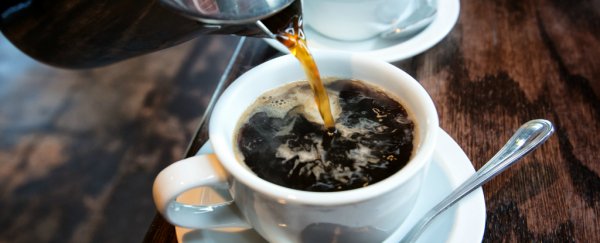Bad news, coffee drinkers: A California judge has ruled that coffee companies across the state will have to carry a cancer warning label because of a carcinogen that is present in the brewed beverage.
Superior Court Judge Elihu Berle sided with a nonprofit's case against dozens of coffee companies, including Starbucks, Peets and other chains, saying that businesses that sold coffee were in violation of a state regulation requiring businesses with at least 10 employees to disclose the prevalence of carcinogens and toxic chemicals.
"While plaintiff offered evidence that consumption of coffee increases the risk of harm to the fetus, to infants, to children and to adults, defendants' medical and epidemiology experts testified that they had no opinion on causation," Berle wrote.
"Defendants failed to satisfy their burden of proving by a preponderance of evidence that consumption of coffee confers a benefit to human health."
Acrylamide is a known carcinogen that is produced naturally during the process of baking or frying some foods.
It is produced in coffee beans when they are roasted, and is prevalent in brewed cups.
Berle's ruling, which was reported by the Associated Press, noted that neither side disputed that acrylamide is present in coffee.
He wrote that the defendants had failed to show that it posed no risk or added any health benefits to coffee at all.
According to the Associated Press, the defense was burdened with showing that acrylamide in coffee wouldn't cause one or more cases of cancer for every 100,000 people, but the judge said that the risk had not been properly evaluated.
The case was filed nearly eight years ago; Berle's ruling is tentative, but is unlikely to be reversed. The third phase of the trial will determine the civil penalties that coffee companies are liable for.
In addition to the warning signs likely to result from the lawsuit, the Council for Education and Research on Toxics, which brought the lawsuit, has asked for fines as much as $2,500 for every person exposed to the chemical since 2002, potentially opening the door to massive settlements.
Starbucks is the lead defendant in the case; others like 7-Eleven have already settled. Starbucks did not immediately respond to a request for comment.
Some have accused lawyers of taking advantage of the state regulation, which includes exemptions for some chemicals that occur naturally in uncooked food, for settlement money; fried potatoes contain acrylamide, and the same law firm represented the nonprofit in a lawsuit against chip manufacturers.
The complaint filed by the nonprofit in the coffee case argues that a 12-ounce serving of coffee contains a statistically significant level of acrylamide.
According to The Washington Post's Tim Carman, "the scientific evidence linking acrylamide to cancer in humans is scant."
According to the American Cancer Society, studies have found that acrylamide increases the risk of cancer in rats and mice when the chemical is placed in the animals' drinking water at doses "1,000 to 10,000 times higher than the levels people might be exposed to in foods." The society doesn't know yet how the results would translate to humans, but it suggests limiting your intake of acrylamide.
As for studies with people, the American Cancer Society notes, "Most of the studies done so far have not found an increased risk of cancer in humans. For some types of cancer, such as kidney, endometrial and ovarian cancer, the results have been mixed, but there are currently no cancer types for which there is clearly an increased risk related to acrylamide intake."
Coffee has been the subject of a seemingly endless number of studies demonstrating that it's good for you, bad for you, and maybe even neither.
A recent analysis of coffee studies showed that several found "probable" evidence that coffee consumption was actually associated with a decreased risk of many cancers, including breast, colon and prostate, concluding that "coffee can be part of a healthful diet."
2018 © The Washington Post
This article was originally published by The Washington Post.
